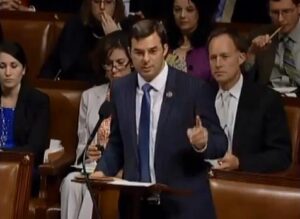When it was thought that the National Security Agency (NSA) mass surveillance program only included the metadata of U.S. personal phone calls without suspicion — that is, who called who, at what time, and the locations — the program barely survived a 205 to 217 vote to defund it in an amendment proposed by Rep. Justin Amash (R-Mich.) last July in the House of Representatives.
That amendment would have prohibited collection “tangible things… if such things do not pertain to a person who is the subject of [a national security] investigation,” which requires an individual warrant issued by a judge based on probable cause.
Now, based on new disclosures by the Washington Post, we know it also includes the content of U.S.-based communications, including emails, text messages, and even real-time voice and video.
Although the Foreign Intelligence Surveillance Act requires such U.S.-based data be “minimized” to prevent American identities from being disclosed to NSA analysts when it is queried, the problem is that as the Post reports, “The raw data is stored intact in NSA databases.”
Meaning it is apparently being included in those databases prior to any issuance of a warrant.
Now, at least one critic of the program says it is time for a revote on the Amash amendment.
“Based on these new revelations showing it’s not just the metadata but the content of U.S. communications being obtained by the NSA, now is the time for the House to act,” said Americans for Limited Government President Nathan Mehrens.
“There should be a revote on the Amash amendment to ensure that these general warrants are never used again to invade the American people’s privacy. The government has reportedly made no showing based on probable cause of the particular persons or things to be searched prior to the content of these communications being stored in the databases. That is outrageous, and it is unconstitutional,” Mehrens declared.
On June 19, the House did adopt an amendment to the Department of Defense Appropriations Act offered by Rep. Thomas Massie (R-Ky.). It restricts the circumstances under which intelligence analysts can query data for collection with U.S. person identifiers.
It’s a good first step, but it still would not go as far as the original Amash amendment, which required that the U.S. person actually be a subject in such an investigation in order for the data to even be collected in the first place.
And that’s where the real rub is. The government cannot be allowed to acquire in advance these communications for later use.
That is, if the letter and spirit of the Fourth Amendment is to be followed. It protects against unreasonable searches and the requires that warrants only be issued upon probable cause, and only then against particular persons on specific circumstances detailing what is to be searched.
Instead, what is apparently happening is the data is being acquired first, and warrants only come into play after the fact. To stop it and to preserve the Fourth Amendment may require that the Amash amendment be reconsidered by the House.
Robert Romano is the senior editor of Americans for Limited Government.







